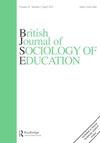“Miss, can you speak English?”: raciolinguistic ideologies and language oppression in initial teacher education
IF 2.1
3区 教育学
Q1 EDUCATION & EDUCATIONAL RESEARCH
引用次数: 1
Abstract
Abstract Racism is pervasive within the lives of racially minoritised pre-service teachers in England, but little work has explored how perceptions about language feature here. Based on interviews and workshops with 26 racially minoritised pre-service teachers, I describe their experiences of language oppression whilst on school experience placements, where they were instructed by mentors to modify, flatten, and completely abandon their ways of talking if they were to be perceived as legitimate. I show how language oppression gets justified by mentors in reference to national policy, and how perceptions about the quality of speech are ideologically anchored to perceptions about the quality of teaching. I show how language oppression often materialises under seemingly benevolent and humanitarian guises, but inevitably maintains the raciolinguistic status quo because it instructs racialised teachers to adapt their speech so that it appropriates whiteness. I argue that language oppression is a key reason why England continues to fail to retain racially marginalised teachers.“小姐,你会说英语吗?”:启蒙教师教育中的种族主义意识形态和语言压迫
摘要种族主义在英国少数种族的职前教师的生活中普遍存在,但很少有研究探讨对语言的看法在这里是如何表现的。根据对26名少数种族的职前教师的采访和研讨会,我描述了他们在学校实习期间的语言压迫经历,导师指导他们修改、扁平化并完全放弃他们的谈话方式,如果他们被认为是合法的。我展示了导师如何根据国家政策为语言压迫辩护,以及对言论质量的看法如何在意识形态上与对教学质量的看法相联系。我展示了语言压迫是如何在看似仁慈和人道主义的伪装下实现的,但不可避免地保持了种族主义的现状,因为它指示种族化的教师调整他们的演讲,使其适合白人。我认为,语言压迫是英国继续未能留住种族边缘化教师的关键原因。
本文章由计算机程序翻译,如有差异,请以英文原文为准。
求助全文
约1分钟内获得全文
求助全文
来源期刊
CiteScore
3.70
自引率
9.50%
发文量
74
期刊介绍:
British Journal of Sociology of Education is one of the most renowned international scholarly journals in the field. The journal publishes high quality original, theoretically informed analyses of the relationship between education and society, and has an outstanding record of addressing major global debates about the social significance and impact of educational policy, provision, processes and practice in many countries around the world. The journal engages with a diverse range of contemporary and emergent social theories along with a wide range of methodological approaches. Articles investigate the discursive politics of education, social stratification and mobility, the social dimensions of all aspects of pedagogy and the curriculum, and the experiences of all those involved, from the most privileged to the most disadvantaged. The vitality of the journal is sustained by its commitment to offer independent, critical evaluations of the ways in which education interfaces with local, national, regional and global developments, contexts and agendas in all phases of formal and informal education. Contributions are expected to take into account the wide international readership of British Journal of Sociology of Education, and exhibit knowledge of previously published articles in the field. Submissions should be well located within sociological theory, and should not only be rigorous and reflexive methodologically, but also offer original insights to educational problems and or perspectives.

 求助内容:
求助内容: 应助结果提醒方式:
应助结果提醒方式:


